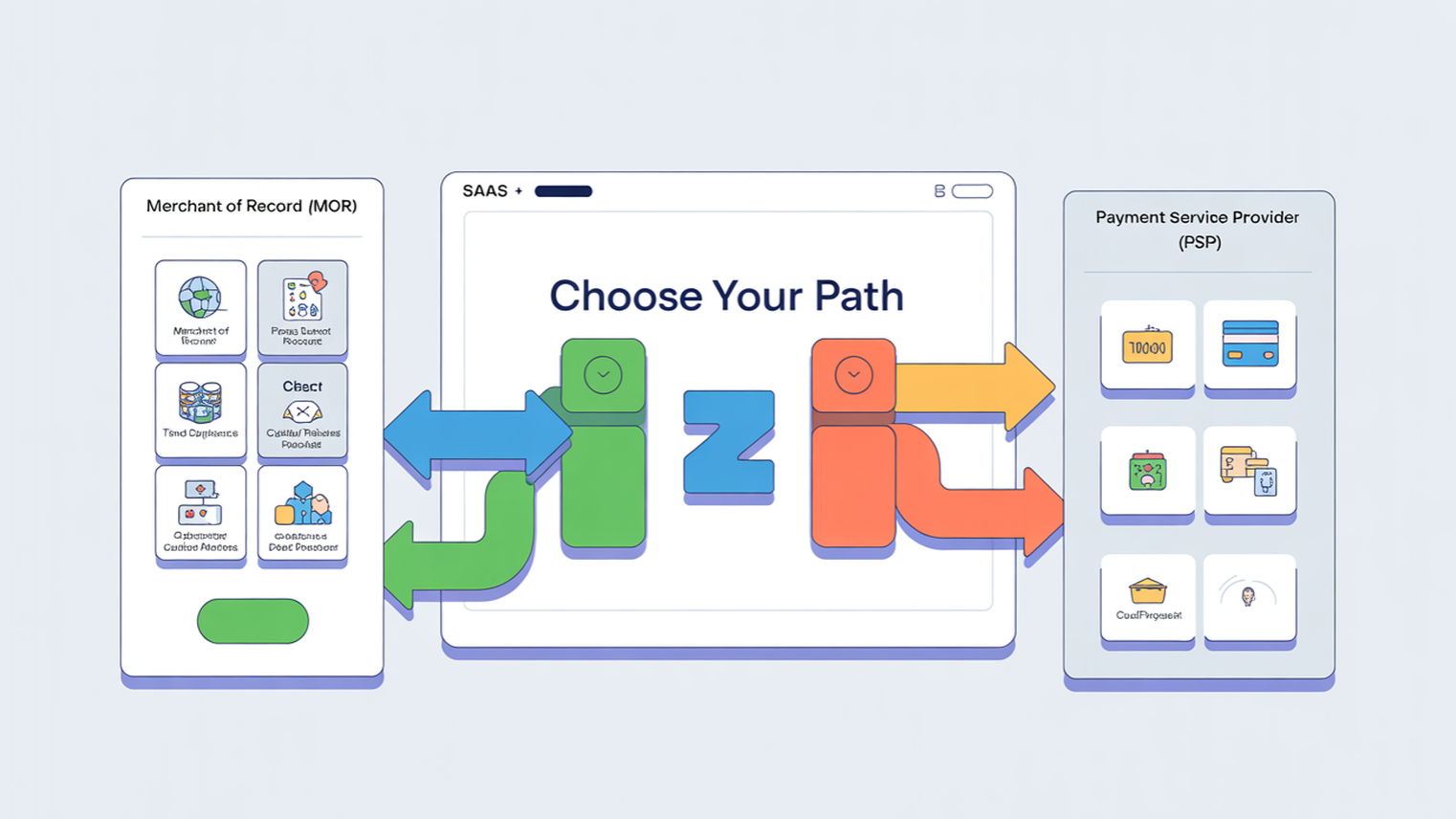Introduction
Selecting the right payment model is one of the most important decisions for any SaaS business. This choice affects revenue flow, customer experience, compliance, and your ability to scale internationally. Two popular approaches are Merchant of Record (MoR) and Payment Service Provider (PSP). While both process payments, they work very differently and meet distinct business needs.
Understanding MoR
A Merchant of Record is a company that legally owns and manages your transactions. This includes billing, handling compliance, managing taxes, dealing with fraud, and processing refunds. Essentially, the MoR becomes the legal face of your payment operations, taking on responsibility so you can focus on product development and growth.
Benefits of MoR:
- Handles international taxes, VAT, and compliance automatically.
- Reduces liability from chargebacks and fraudulent transactions.
- Simplifies subscription and recurring billing processes.
Limitations of MoR:
- Less visibility and control over customer payment data.
- Higher fees due to the bundled services they provide.
Understanding PSP
A Payment Service Provider is a platform that facilitates transactions between your customers and your bank. PSPs provide the technology and infrastructure to accept payments but leave compliance, tax obligations, and fraud management up to you.
Benefits of PSP:
- Full control over customer payment information.
- Typically lower transaction fees than MoR services.
- Flexibility to integrate with multiple payment methods and platforms.
Limitations of PSP:
- Your business is responsible for tax, compliance, and fraud management.
- More internal resources required to manage global or complex billing.
How MoR vs PSP Operates
Understanding MoR vs PSP is crucial for SaaS businesses because each model manages payments, compliance, and revenue in its own way. MoR assumes full responsibility for taxes, refunds, and regulatory compliance. On the other hand, PSP offers the infrastructure to process payments but leaves operational and legal duties to your business.
MoR Process:
- Customer completes payment on your SaaS platform.
- MoR processes the transaction, calculates taxes, and ensures compliance.
- MoR deposits the net revenue into your account after fees.
PSP Process:
- Customers pay through the PSP gateway integrated with your SaaS.
- Payment is authorized and processed.
- Funds go directly to your business account, but you handle tax and compliance responsibilities.
Key Differences Between MoR and PSP
- Compliance Responsibility: MoR handles taxes, regulations, and legal requirements. PSP requires your team to manage compliance.
- Fraud & Risk Management: MoR takes responsibility. PSP requires your oversight.
- Customer Data Access: PSP gives full access. MoR limits direct access.
- Fees: MoR charges higher fees for its services. PSP is usually lower but does not include compliance management.
- International Expansion: MoR simplifies global transactions. PSP often needs extra integrations.
- Customization & Flexibility: PSP offers more options for billing models. MoR emphasizes simplicity and reliability.
Which SaaS Businesses Should Use MoR?
- A startup or small SaaS company that wants minimal operational burden.
- A company selling internationally without wanting to manage taxes and compliance manually.
- A business prioritizing smooth checkout and reduced risk from chargebacks and fraud.
Which SaaS Businesses Should Use PSP?
A business with an in-house finance team capable of handling compliance and tax reporting. A company that wants direct access to customer data for analytics and marketing. A SaaS platform looking for flexible, customizable billing and payment integrations.
FAQs about MOR vs PSP
1. Is MoR better for global SaaS growth?
Yes, MoR simplifies international expansion by handling currency conversion, taxes, and compliance automatically.
2. Can I switch from PSP to MoR later?
Yes, companies often start with a PSP for flexibility and migrate to MoR as they expand internationally. Proper planning is critical.
3. How do fees compare?
MoR fees are higher due to bundled services like compliance and fraud protection. PSP charges are lower but require you to manage extra tasks.
4. Do MoRs improve the checkout experience?
Yes, MoR platforms often provide localized payment methods and smooth subscription management.
5. Is PSP suitable for startups?
Yes, if you have a capable team and want full control, PSP can be cost-effective and flexible. 6. How does fraud protection differ? MoR assumes responsibility for detecting and managing fraud, while PSP requires you to implement your own solutions.
Conclusion
Choosing the right payment model depends on your SaaS business stage, goals, and internal resources. MoR is best for businesses seeking simplicity, support with compliance, and fast global scaling. PSP is better for companies that prioritize control, flexibility, and cost efficiency. Evaluating your needs carefully helps create a payment strategy that boosts revenue, lowers risk, and keeps customers satisfied.









